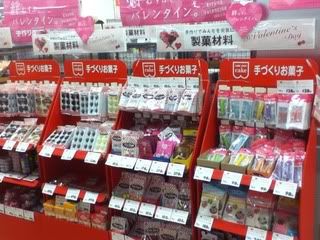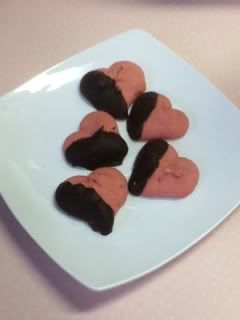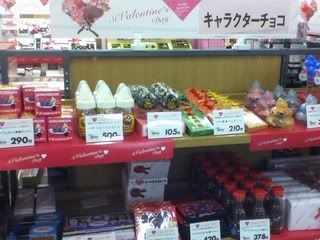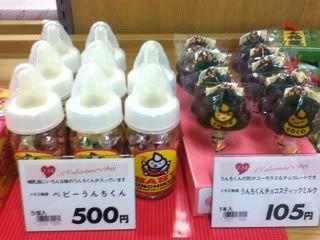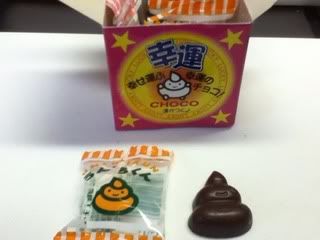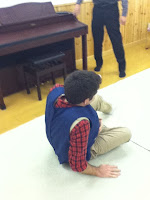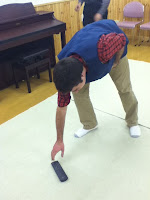The class brought together women from the same neighborhoods with due dates close together for conversation and lessons about pregnancy and motherhood. Of course, these classes were all in Japanese, but understanding the content was a bonus in my mind. I was going with the intention of breaking into the "mommy" group in my community.
The class itself was broken up into 4 teaching sessions and 1 postpartum play group scheduled for September. I was surprised how much I actually understood from the class. It's probably due to the text book (with pictures!) they handed out the first day. Well, that and the very kind women who helped the confused gaijin (foreigner) in their group.

new moms practicing diapering and dressing baby-dolls
Some of the information was old hat. Things like, eat proper meals that include all the food groups. Some of it was surprising, like finding out that fruit is on the "only eat a little bit" side of the food pyramid, rather than next to the vegetables.
Photo credit: The Food Guide Pyramid
During the class, I kept a running mental note about things to share with you all from my experience. so, for your enjoyment, I present:
"strange and interesting things I learned at "moms' class"
Diet:
I've already mentioned about the food guide strangeness I encountered. I also was not expecting 10 pages of a 70 page book to be devoted to telling women things like "don't eat a lot of fatty and salty foods." In our discussion groups, I got the feeling that these women are terrified of gaining too much weight while pregnant. One woman said it was important to "not eat your favorite foods, so you don't get fat." And all the rest of the skinny Japanese ladies agreed that getting fat would be horrible. The lone American just kept quiet and thought about the candy bar waiting for her in her purse.
Pain relief:
In two of the four class sessions, a woman from my group was brought up for a demonstration. A strip of bleached cotton cloth was pulled tightly around her hips. When I asked my neighbor why, she explained it was for pain relief. Not being satisfied with that answer, I asked when one would do this. I assumed after birth, since I know the Japanese have a tradition of wrapping one's hips to put them back into place after birth. Nope, she said you do it before birth, to ease back and hip pain. I was under the impression that my hips and back hurt because my hips were supposed to move outward to prepare for labor.
I think I'll stick with tylenol, thanks.
Bathing babies:
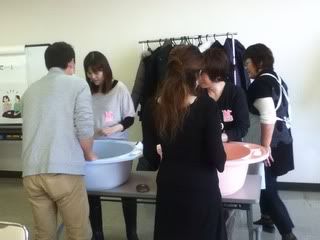
Using life-like baby-dolls, moms (and some dads) practiced bathing babies
I was really glad we got some instruction and practice on this topic. Since I've never bathes a slippery little baby before, I'm going to assume everything they taught was standard procedure in the US also. One thing I was surprised to find out, though, was how frequently they recommend bathing your baby. When I asked my instructor, she said "Mai nichi" (EVERYDAY!) How dirty do these babies plan on getting? I thought rolling in the dirt was an activity for older toddlers, myself.
The advice does fit with the culture though. Japan is all about their baths. Whole vacations are planned around where has the best "Onsen" (public baths/spa). I'm sure my instructor thought Americans are filthy when I said most people only bathe their babies every other day or so (I think even this frequency is being a bit generous.)
